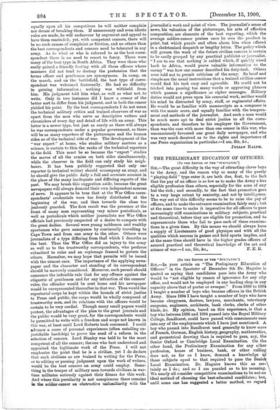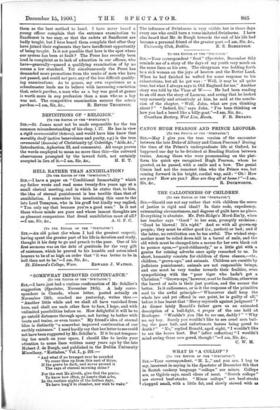[TO THE EDITOR Olr THE " SPECTATOR."] Srn,—In your article
on "The Prelirp inary Education of Officers " in the Spectator of December 8th Dr. Maguire is quoted as saying that candidates pass into the Army who would be "not eligible by reason of ignorance for any city office, and would not be employed in any leading shop in any capacity above that of porter or sweeper." From 1888 to 1894 I taught a number of boys who became officers in the British Army. Since 1894 I have taught a number of boys who have become clergymen, doctors, lawyers, merchants, veterinary surgeons, engineers, architects, bank clerks, clerks of other kinds, &c. My opinion, based on this experience, is that a boy who between 1888 and 1894 passed into the Royal Military College, Sandhurst, could have passed with consummate ease into any of the employments which I have just mentioned. A boy who passed into Sandhurst used generally to know• more of French, German, English history, geography, mathematics, and geometrical drawing than is required to pass, say, the Senior Oxford or Cambridge Local Examination. On- the other hand, the Preliminary Examination for any other profession, house of business, bank, or othercalling does not, as far as I know, demand a knowledge those subjects equal to that required to pass the Senio Local Examination. Dr. Maguire knows this as cer- tainly as I do ; and so I am puzzled as to his meaning. We nearly all consider competitive examinations to be not an ideal method of choosing the best-educated candidates ; but, until some one has suggested a better method, we regard them as the best method to hand. I have never heard a young officer complain that the entrance examination to Sandhurst is too easy, or that the cadets at Sandhurst are badly taught, but I have heard them complain that after they have joined their regiments they have insufficient opportunity of being taught. Is it not possible that here is the spot where our system has been at fault ? The Press has recently been loud in complaint as to lack of education in our officers, who have—generally--passed a qualifying examination of by no means a low standard. Yet simultaneously the Press has demanded more promotions from the ranks of men who have not passed, and could not pass, any of the less difficult qualify- ing examinations. As to games, my own experience as a schoolmaster leads me to believe with increasing conviction that, ceteris paribus, a man who as a boy was good at games is worth more in any profession than a man who as a boy was not. The competitive examination secures the ceteris















































 Previous page
Previous page